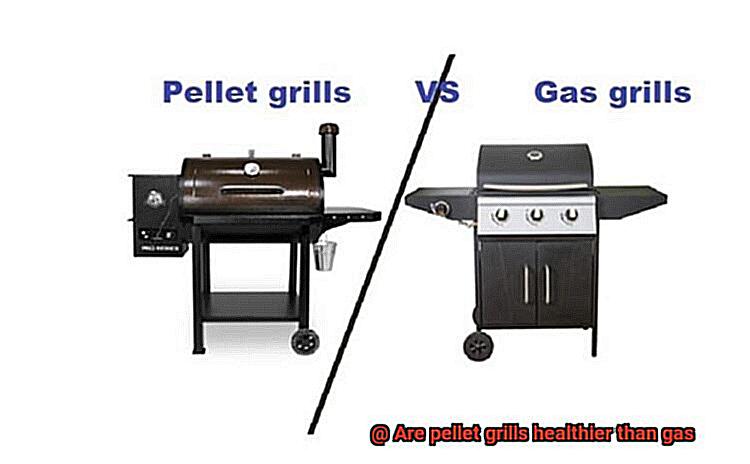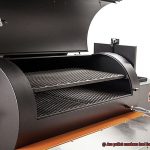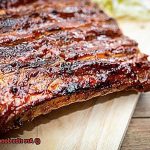In the world of outdoor cooking, where flames dance and flavors mingle, grilling has become an art form cherished by food enthusiasts everywhere. From sizzling steaks that make your taste buds tango to perfectly charred vegetables that burst with freshness, the allure of a well-grilled meal is simply irresistible. But as our health-consciousness grows, so does our concern about the potential health risks associated with traditional gas grilling. Is there a better way?
Enter the pellet grill – a rising star in the realm of outdoor cooking that not only delivers mouth-watering results but also promises a healthier grilling experience. In this article, we will embark on a journey through the captivating realm of pellet grills and uncover why they have captured the hearts (and stomachs) of health-conscious grillers.
While gas grills have long been hailed for their convenience and efficiency, pellet grills offer unique advantages that set them apart from their gas-powered counterparts. These advantages not only contribute to an enhanced grilling experience but also ensure that your food is prepared in a significantly healthier manner.
So, let’s dive into the mesmerizing world of pellet grills and unravel the remarkable health benefits they provide. By the end of this read, you’ll have all the juicy details you need to understand why pellet grills reign supreme over gas when it comes to keeping both your taste buds and your body happy and healthy.
Contents
What is a Pellet Grill?
In this article, we’ll explore what exactly a pellet grill is and why it has gained popularity among backyard chefs.
The Basics of a Pellet Grill:
At its core, a pellet grill, also known as a pellet smoker, utilizes small wood pellets as its fuel source. These pellets are made from compressed sawdust and other hardwood materials, which give them the ability to produce flavorful smoke.
How it Works:
The magic happens inside the firebox of a pellet grill. An electric igniter heats up the pellets and starts a small fire, while a fan blows air into the firebox, allowing the pellets to burn efficiently and generate smoke. This smoke is then circulated around the cooking chamber, infusing the food with that distinct smoky flavor.
Temperature Control:
One of the standout features of a pellet grill is its ability to maintain a consistent temperature throughout the cooking process. A digital controller allows you to set and monitor the desired temperature, while built-in thermometers ensure accuracy. This precise temperature control opens up a world of possibilities, from low-and-slow smoking to high-temperature searing.
Convenient Features:
Pellet grills offer additional features that enhance your grilling experience. Many models have a direct flame option, allowing you to cook directly over an open flame for that charred and smoky flavor. Built-in meat probes help you monitor the internal temperature of your food without opening the lid, ensuring perfectly cooked dishes every time.
Health Considerations:
When it comes to health, pellet grills offer some advantages over traditional gas grills. The indirect heat cooking capabilities of pellet grills reduce the risk of charring or burning, resulting in healthier and juicier meals. Additionally, precise temperature control helps prevent food from being overcooked or undercooked, promoting food safety.
Benefits of Pellet Grills
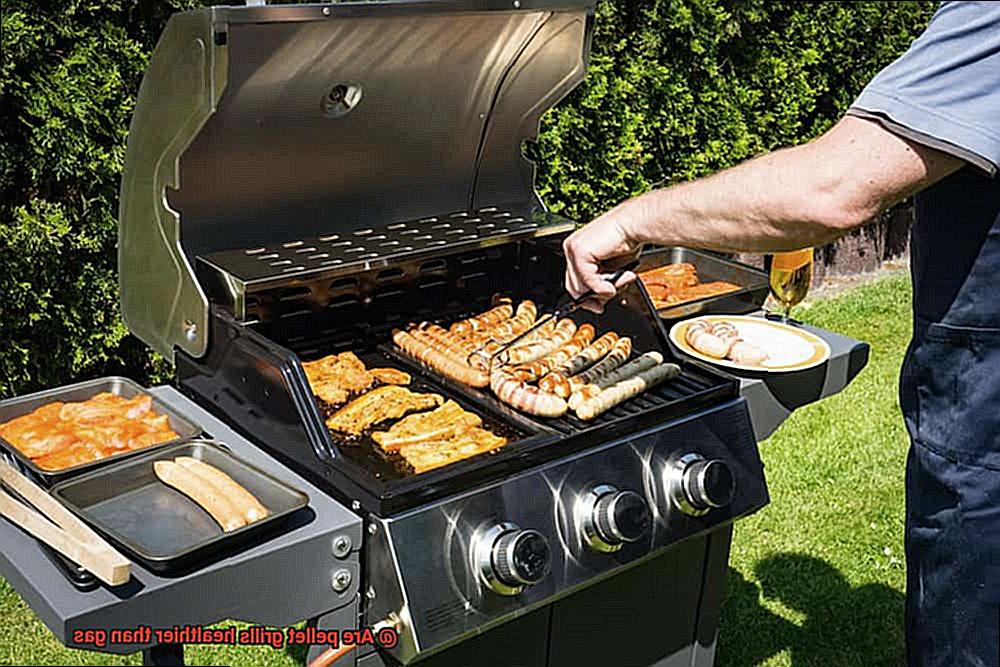
Look no further than a pellet grill. These incredible grills offer a whole new level of flavor and convenience that will have you grilling like a pro in no time. So, what exactly are the benefits of using a pellet grill? Let’s dive in.
First and foremost, let’s talk about flavor. Pellet grills have the amazing ability to infuse your food with that delicious smoky, wood-fired taste. Unlike gas grills that rely on propane or charcoal grills that use briquettes, pellet grills use natural hardwood pellets as their fuel source. These pellets are made from compressed sawdust and contain no additives or fillers. When you cook on a pellet grill, you’re getting all the natural flavors of the wood without any unwanted chemicals or artificial tastes. Trust me, your taste buds will thank you.
But flavor isn’t the only thing that sets pellet grills apart. These versatile grills can do it all. From grilling and smoking to roasting, baking, and even braising, pellet grills offer a wide range of cooking options. With precise temperature control and a variety of temperature settings, you can experiment with different recipes and techniques to create mouthwatering meals that will impress even the toughest food critics.
Now, let’s talk about ease of use. Pellet grills take the hassle out of outdoor cooking. No more worrying about lighting and monitoring the fire or constantly adjusting the temperature. Pellet grills have an automated system that controls the temperature for you. The digital controller regulates the flow of pellets into the fire pot, maintaining a consistent temperature throughout the cooking process. This means less time spent babysitting the grill and more time enjoying your delicious creations.
But it’s not just about convenience; it’s also about your health. When it comes to grilling, safety is always a concern. Gas grills can produce harmful chemicals when fat drips onto hot surfaces or flare-ups occur. These chemicals can be carcinogenic and pose health risks when consumed regularly. Pellet grills, on the other hand, produce less smoke and flare-ups due to their indirect heat cooking method. This means fewer harmful compounds on your grilled food and peace of mind knowing that you’re cooking in a healthier way.
Speaking of health, pellet grills also offer healthier cooking options. The ability to control temperature and cook food at lower temperatures means that meat retains more moisture and is less likely to dry out. This results in juicier and more tender meat without the need for excessive oils or fats. And let’s not forget about the natural hardwood pellets themselves. They add flavor without the need for additional seasoning or marinades, reducing the intake of sodium and other potentially unhealthy additives.
But wait, there’s more. Pellet grills are also environmentally friendly. The wood pellets used as fuel are made from sawdust, a byproduct of the lumber industry. By using wood pellets instead of traditional charcoal or gas, you’re not only reducing waste but also contributing to sustainable cooking practices. Some pellet grill manufacturers even offer pellets made from sustainably sourced wood, so you can feel good about your grilling choices.
Drawbacks of Pellet Grills
Grilling aficionados are constantly in search of the holy grail of grills that seamlessly combines convenience, flavor, and versatility. While pellet grills have stormed onto the scene with their ability to infuse an irresistible smoky essence into any dish, it’s crucial to uncover their drawbacks before diving headfirst into the investment. In this comprehensive exploration, we will dig deep into the limitations of pellet grills in comparison to their gas counterparts, arming you with the knowledge needed to make an informed decision.
Temperature Limitations:
Pellet grills excel in low and slow cooking, such as smoking, but they often struggle to achieve the scorching heat required for flawless searing or achieving a tantalizingly crispy skin on meats. If you yearn for a perfectly charred steak that sizzles with deliciousness, a gas grill might be your ideal match.
Cost Considerations:
Pellet grills generally come with a heftier price tag in comparison to gas grills. Alongside the initial investment, ongoing expenses for purchasing wood pellets can pile up over time. Moreover, certain pellet grills may necessitate additional accessories like hopper extensions or sear grates, further inflating the overall cost.
Complexity and Maintenance:
Pellet grills boast more intricate mechanisms than their gas counterparts. The demand for electricity to power the auger and fan that feed the pellets into the firepot restricts their portability. Additionally, pellet grills harbor more parts and components that may require regular maintenance or repair over time. If simplicity and minimal upkeep are your preference, a gas grill might be a better fit.
Dependence on Electricity:
Unlike gas grills that can withstand power outages, pellet grills heavily rely on electricity to function. This means that if you reside in an area prone to power outages or relish grilling in remote locations without access to electricity, a pellet grill may not be the most reliable option.
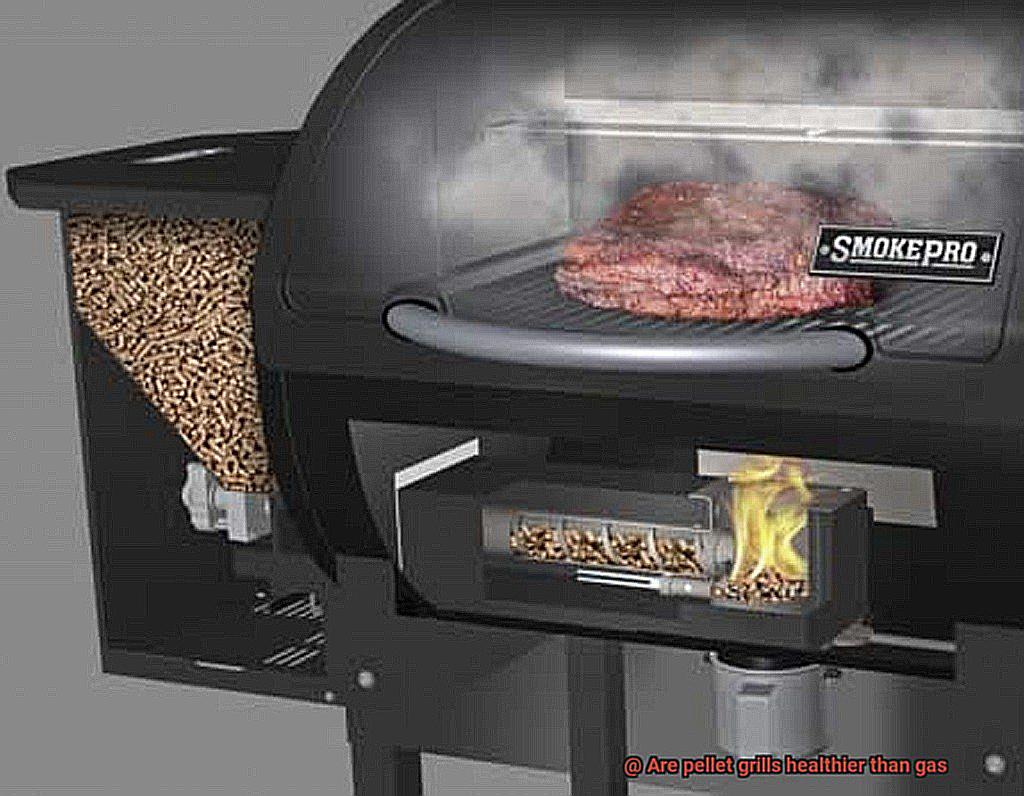
Pellet Availability:
While wood pellets are generally accessible, certain areas may offer limited variety in terms of flavors and brands. This can pose a drawback if you have specific flavor preferences for different wood pellets or have limited access to diverse options.
Learning Curve:
Mastering the art of using a pellet grill requires time and experimentation. Discovering the perfect temperature settings and comprehending how different wood pellet flavors influence the taste demands practice and patience. This learning curve may discourage beginners or those who prefer a more straightforward grilling experience.
Smoke Flavor Intensity:
The adoration for the smoky flavor bestowed by pellet grills is not universal. Some individuals might find it overpowering or unappetizing. The constant production of smoke can saturate the food with an overpowering smoky taste, which may not suit everyone’s palate.
Maintenance and Cleaning:
Pellet grills necessitate regular maintenance and cleaning to ensure peak performance. This includes clearing out the firepot and ash accumulation while ensuring the auger and fan function optimally. Some users might consider this upkeep more time-consuming compared to gas grills.
What is a Gas Grill?
Look no further than the gas grill – the ultimate tool for backyard chefs seeking convenience, versatility, and mouthwatering results. Let’s dive into what makes a gas grill so special and explore its key components.
At the heart of every gas grill are the burners, the powerhouses responsible for generating the intense heat needed to cook your food to perfection. Crafted from durable stainless steel or cast iron, these burners boast adjustable knobs that give you complete control over the temperature. Whether you’re searing a juicy steak or slow-cooking tender ribs, the gas grill’s burners provide the flexibility you need to create culinary masterpieces.
Next up, we have the cooking grates – the sturdy surfaces on which your food sizzles and sears. Made from high-quality stainless steel or cast iron, these grates ensure even heat distribution, resulting in those coveted grill marks and delectable flavors that make your taste buds dance with delight.
But what about those dreaded flare-ups? Fear not. Gas grills come equipped with heat shields or flavorizer bars. These ingenious inventions catch drippings from your food and transform them into flavorful smoke, eliminating those pesky flare-ups while infusing your grilled creations with an irresistible smoky essence. It’s a win-win situation for both taste and safety.
Let’s not forget about the lid – your trusty grilling partner in crime. This essential component helps retain heat and control airflow, ensuring consistent cooking throughout your food. By trapping in the heat, the lid guarantees juicy, succulent results every time. And thanks to its moisture-locking abilities, you’ll never have to worry about dry cuts of meat again.
But wait, there’s more. Gas grills often come with additional features that take outdoor cooking to new heights. From side burners for whipping up delectable sauces and sides to rotisserie kits for achieving that perfect, golden roast chicken, gas grills offer a world of possibilities. Warming racks keep your food hot while you put the finishing touches on other dishes, and storage cabinets keep all your grilling tools organized and at your fingertips.
Benefits of Gas Grills
Grilling is an art form that brings people together over delicious food and unforgettable memories. If you’re new to grilling and looking for a convenient, versatile, and safe option, then a gas grill is your best bet. In this blog post, we’ll explore the top benefits of gas grills and why they are an ideal choice for anyone who wants to enjoy mouthwatering grilled food.
Convenience:
Gas grills offer unmatched convenience. With just a push of a button or twist of a knob, you can ignite the burners and start grilling within minutes. Forget about time-consuming preparation and cleanup like with charcoal grills. With gas grills, there’s no more waiting for briquettes to heat up or dealing with messy ashes.
Precise Temperature Control:
Achieving the perfect cooking temperature is a breeze with gas grills. Most models come with adjustable knobs or dials that allow you to easily regulate the heat. This is especially useful when cooking delicate foods like fish or vegetables that require specific cooking temperatures. You can achieve consistent results every time without worrying about undercooking or overcooking your food.
Even Heat Distribution:
Gas grills are designed to distribute heat evenly across the cooking surface, ensuring that your food cooks uniformly. Well-designed burners provide consistent heat throughout the grill, whether you’re searing steaks or slow-cooking ribs. Your food will be perfectly cooked from edge to edge.
Versatility:
Gas grills offer various cooking methods, making them incredibly versatile. You can use them for direct grilling, where food is cooked directly over the flame, or indirect grilling, where the heat is circulated around the food for slower cooking. Some gas grills even come with additional features like side burners or rotisserie attachments, allowing you to expand your culinary repertoire and try new recipes.
Easy Cleanup:
Cleaning up after a grilling session is a breeze with gas grills. Unlike charcoal grills that require removing ash and charcoal residue, gas grills only need a simple wipe-down. Some gas grills even come with removable grease trays or drip pans, making cleanup even easier. Spend less time cleaning and more time enjoying your delicious meal.
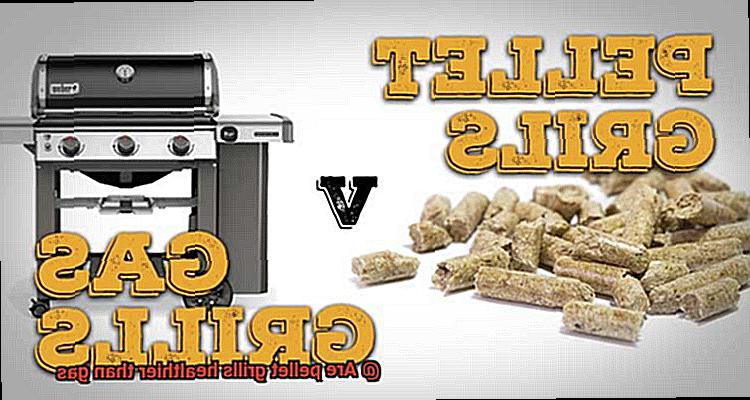
Cost-Effectiveness:
While the initial cost of purchasing a gas grill may be higher compared to other types, they are more cost-effective in the long run. Propane tanks used in gas grills can last for multiple grilling sessions before needing to be replaced. Plus, gas grills tend to be more fuel-efficient, saving you money on fuel expenses.
Healthiness:
Gas grilling offers a healthier cooking option compared to charcoal grilling. Gas grills produce fewer carcinogens and toxins because they don’t produce as much smoke or flare-ups that can lead to the formation of harmful compounds on grilled food. You can enjoy delicious grilled meals while prioritizing your health.
Safety:
Safety should always be a top priority when it comes to outdoor cooking. Gas grills eliminate the need for open flames or burning embers, reducing the risk of accidental fires. They also come with safety features like automatic ignition systems and built-in temperature gauges to ensure safe and controlled cooking.
Drawbacks of Gas Grills
Gas grills have become a staple in many households for their convenience and ease of use. However, it’s important to consider the drawbacks before investing in one. Here are some factors to keep in mind when deciding if a gas grill is right for you:
- Flare-ups: Imagine grilling juicy steaks only to have the flames unexpectedly leap up and char your meat. Not only does this ruin the taste and texture, but it can also be a safety hazard. Fat dripping onto hot burners or lava rocks causes sudden bursts of flames, creating a risk of overcooking or burning your food.
- Limited flavor: Gas grills often lack the smoky flavor associated with charcoal or pellet grills. While some gas grills have smoker boxes or flavorizer bars to enhance taste, they may not provide the same depth of flavor as other types of grills. If you crave that authentic smoky taste, gas grills may not satisfy your culinary desires.
- Uneven heat distribution: Gas grills typically have a single heat source, leading to hot spots and cold spots on the grill surface. Achieving consistent cooking results across the entire grill can be challenging, resulting in unevenly cooked food.
- Cost: Gas grills can be more expensive than other types of grills, especially high-end models with fancy features. Additionally, ongoing costs are associated with using gas grills, such as purchasing propane tanks or natural gas for fuel. If you’re on a tight budget or prefer to avoid ongoing expenses, a gas grill might not be the best choice for you.
- Maintenance: Gas grills require regular cleaning and upkeep to ensure optimal performance and longevity. This includes cleaning the burners, checking for leaks, and replacing parts as needed. Neglecting maintenance can lead to decreased efficiency and potential safety hazards.
- Limited portability: Gas grills are typically larger and heavier than other types of grills, making them less portable. If you enjoy grilling on-the-go or have limited outdoor space, a gas grill may not be the most convenient option.
- Environmental impact: While gas grills are considered more environmentally friendly than charcoal grills in terms of carbon emissions, they still contribute to greenhouse gas emissions. Propane, commonly used as a fuel source for gas grills, is a non-renewable resource. Additionally, the production and transportation of propane can have negative environmental impacts.
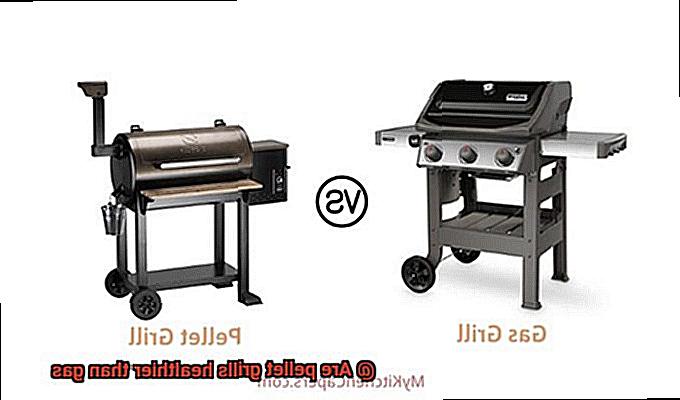

Health Considerations for Both Types of Grills
Grilling is a beloved cooking method, but it’s important to consider the health implications when choosing between charcoal and gas grills. In this article, we will explore the potential health risks associated with each type of grill and provide tips on how to minimize them. So, grab your apron and let’s dive into the sizzling world of grilling.
Gas Grills: The Clean Convenience
Gas grills offer the convenience of a clean and consistent heat source. However, burning gas can release harmful chemicals like carbon monoxide and volatile organic compounds (VOCs). These emissions can contribute to air pollution and have negative health effects, especially for individuals with respiratory conditions like asthma or COPD. To minimize exposure to these pollutants, always use your gas grill in a well-ventilated area, preferably outdoors. Ensure that there is proper airflow around the grill and avoid using it in enclosed spaces like garages or sheds.
Charcoal Grills: The Flavorful Tradition
Charcoal grills provide that classic smoky flavor that many grilling enthusiasts love. However, burning charcoal generates higher levels of carbon monoxide compared to gas grills. Carbon monoxide is a colorless and odorless gas that can be deadly in high concentrations. To reduce the risk of carbon monoxide poisoning, always use charcoal grills in well-ventilated areas and never bring them indoors. It’s also essential to properly extinguish the coals after grilling to prevent the release of carbon monoxide and the possibility of accidental fires.
Carcinogens: A Common Concern
Both types of grills can produce carcinogenic compounds when food is cooked at high temperatures. When meat or other food items are cooked over an open flame or hot coals, chemical reactions occur that can lead to the formation of carcinogens such as heterocyclic amines (HCAs) and polycyclic aromatic hydrocarbons (PAHs). These compounds have been linked to an increased risk of cancer, particularly colorectal, pancreatic, and prostate cancers.
To minimize the formation of these harmful compounds, it is recommended to avoid charring or overcooking food on the grill. Use marinades, herbs, and spices to create flavorful coatings that reduce the formation of HCAs.
Precooking meat before grilling can also help reduce cooking time on the grill and therefore minimize the formation of carcinogens. Additionally, using a drip pan or aluminum foil to catch drippings and prevent flare-ups can help reduce the production of potentially harmful smoke and char.
Maintenance Matters
Proper cleaning and maintenance are crucial for both types of grills to ensure a safe grilling experience. Grease buildup in gas grills can lead to flare-ups and potential injuries. It’s important to regularly clean the grill grates and remove any accumulated grease or debris. For charcoal grills, it’s essential to clean out ash and residue from previous grilling sessions. This not only helps maintain optimal grill performance but also reduces the risk of accidental fires caused by flammable materials.
Follow the manufacturer’s instructions for cleaning and maintenance specific to your grill model. Regularly inspecting gas grills for gas leaks is also important to prevent potential fire hazards.
Food Safety First
Regardless of the type of grill you choose, prioritizing food safety is essential for a healthy grilling experience. Cook food thoroughly to kill any harmful bacteria or pathogens that may be present. Use a meat thermometer to ensure that meat is cooked to the proper internal temperature recommended by food safety guidelines. Avoid cross-contamination by using separate cutting boards and utensils for raw and cooked foods. Properly store perishable items in coolers or refrigerators until ready to grill.
EJqllBPDM18″ >
Conclusion
In conclusion, when it comes to the question of whether pellet grills are healthier than gas grills, the answer is a resounding yes. Pellet grills offer a multitude of health benefits that make them a superior choice for those who prioritize their well-being.
One of the key advantages of pellet grills is their ability to cook food at lower temperatures. This means that there is less risk of charring or burning, which can produce harmful carcinogens. With a pellet grill, you can enjoy perfectly cooked meals without worrying about compromising your health.
Additionally, pellet grills use natural wood pellets as fuel, which adds a unique smoky flavor to your food. These pellets are made from 100% pure hardwood with no additives or chemicals. In contrast, gas grills rely on propane or natural gas, which can sometimes contain impurities that may affect the taste and quality of your meals.
Furthermore, pellet grills allow for precise temperature control and even heat distribution. This ensures that your food cooks evenly and thoroughly without any hot spots or cold areas. On the other hand, gas grills often struggle with maintaining consistent temperatures, leading to undercooked or overcooked food.
Another noteworthy advantage of pellet grills is their versatility. They can be used for various cooking methods such as smoking, roasting, baking, and grilling. This means you can prepare a wide range of dishes using just one appliance, reducing the need for multiple cooking devices and minimizing potential health hazards associated with cross-contamination.
In terms of convenience and ease of use, pellet grills excel as well. Many models come equipped with digital controls and Wi-Fi connectivity, allowing you to monitor and adjust cooking settings from your smartphone or tablet. This eliminates the need for constant monitoring and reduces the chances of accidents or mishaps in the kitchen.
Overall, while gas grills may offer convenience and speed, they fall short in terms of health benefits compared to pellet grills. With their lower cooking temperatures, natural fuel source, precise temperature control, and versatility, pellet grills are undoubtedly the healthier choice for those who prioritize their well-being without compromising on taste or convenience.

